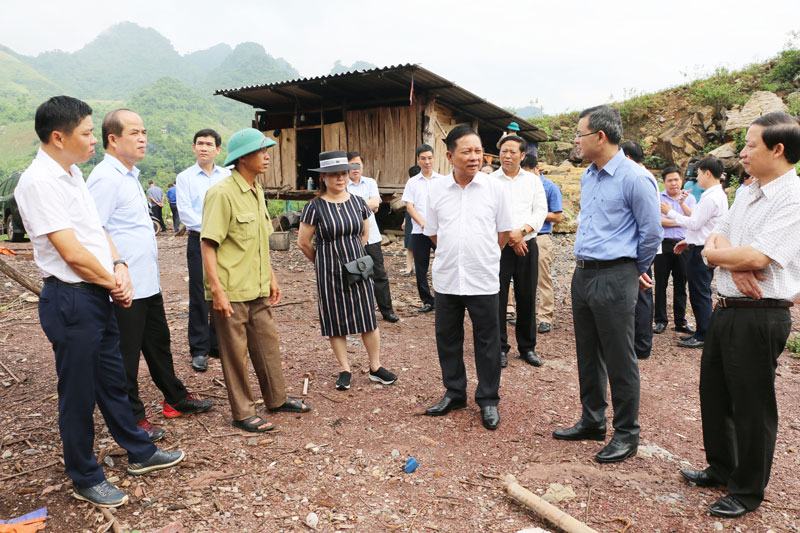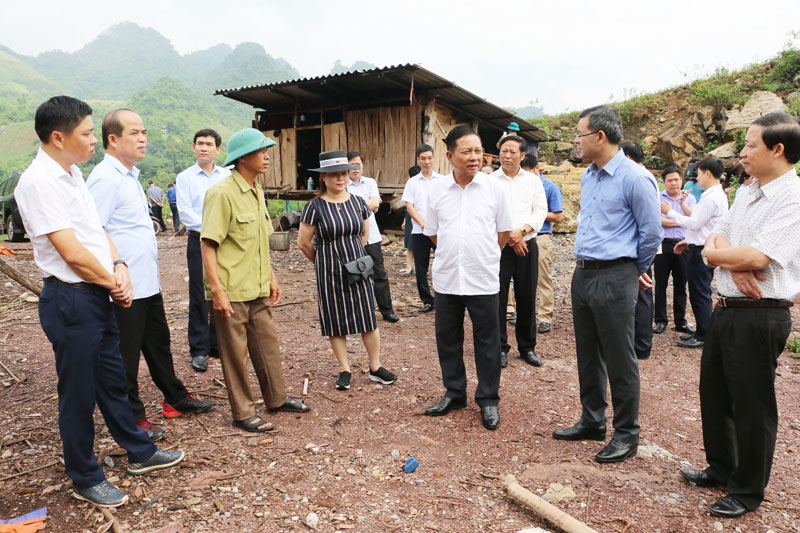
(HBO) - Bui Van Tinh, member of the Party Central Committee and Secretary of the provincial Party Committee, had a working session and inspected the implementation of Programme 135 under the National Target Program for Sustainable Poverty Reduction for 2016 -2020 in Tan Lac district.
 Bui Van Tinh, member
of the Party Central Committee and Secretary of the provincial Party Committee,
and a working group learn about residents’ life and economic development models
in Phu Vinh commune.
Bui Van Tinh, member
of the Party Central Committee and Secretary of the provincial Party Committee,
and a working group learn about residents’ life and economic development models
in Phu Vinh commune.
According to a report from the Tan Lac People's Committee,
effective implementation of the programme has been underway since 2016 to date
without losses of State capital. Village-level management boards are placed in charge
of allocating capital for different projects in line with the principles of
democracy, openness and people’s engagement. During the period, the district
has invested over 64.3 billion VND (2.7 million USD) in 108 infrastructure
projects, and over 3.5 billion VND in repairing 148 others. It has also
conducted 72 projects on production development and livelihood diversification
as well as replicated poverty reduction models with a budget of more than 2.2 billion
VND.
As a result, per capita income has been increased
significantly, while poverty reduction work has progressed well. However,
infrastructure of communes involved in the programme remains lacking and unified,
while the rate of poor households is still high. Production and consumption of
products are also ineffective.
Concluding the function, Tinh recommended Tan Lac district
strengthen coordination with departments and sectors to speed up the
implementation of Program 135. The provincial People's Committee assigned relevant
sectors and departments to speed up project planning and assessment progress,
support production, replicate effective economic development models, and
preserve cultural values of local ethnic communities, among others./.
In the spirit of "Party members go first, the people follow”, all households of Party members in the Doan Ket sub-region in Da Bac town, Da Bac district, voluntarily removed gates and fences, and donated land when the road expansion project passed through their properties. Inspired by their example, 68 households in the sub-region quickly followed suit, contributing over 1,400 sq.m of residential and perennial cropland to widen the main road through the residential area. The exemplary role of Party members in Doan Ket stands as a shining example of studying and following President Ho Chi Minh’s thought, morality, and lifestyle.
The Hoa Binh provincial People's Committee held a monthly meeting on May 29 to assess the implementation of socio-economic development tasks in the first six months of 2025, the progress of key projects, and some other important issues.
During his lifetime, President Ho Chi Minh always expressed his deep affection and special concern for children and youth. He once emphasized: "Caring for and educating children well is the responsibility of the entire Party and the entire people”; "First of all, the family (i.e. grandparents, parents, siblings) must do this job well”. "the Party Committees…, the Children’s Committee, the Youth Union, the education sector, and all related organizations must have specific plans to ensure children grow healthier and more progressive”. His teachings has been remaining valuable and serving as the guiding principles in the work of protecting, caring for, and educating children. In line with this ideology, Hoa Binh Province has continuously been prioritizing and investing resources in the well-being of children in recent years.
Mr. Nguyen Phi Long, the alternate Member of the Party Central Committee and Secretary of the Provincial Party Committee chaired the meeting of the Standing Committee of the Provincial Party Committee to provide opinions on several investment projects within the province. There was the attendance of Ms. Bui Thi Minh, the Permanent Deputy Secretary of the Provincial Party Committee and Chairwoman of the Provincial People’s Council; Mr. Bui Đuc Hinh, the Deputy Secretary of the Provincial Party Committee and Chairman of the Provincial People’s Committee and other members of the Standing Committee; the leaders from other departments, agencies, and some localities.
The Standing Board of the Vietnam Fatherland Front (VFF) Committee of Hoa Binh province held a meeting on May 28 to honour outstanding village elders, village heads, and reputable individuals from local ethnic minority and religious communities.
In mid-May, the provincial Museum organised an exhibition named "Duoi la co Dang Cong san Viet Nam quang vinh” (Under the flag of the glorious Communist Party of Vietnam). This meaningful activity took place in the joyful atmosphere to celebrate the country's major holidays and the Party congresses at all levels for the 2025-2030 term, towards the 14th National Party Congress.



 Bui Van Tinh, member
of the Party Central Committee and Secretary of the provincial Party Committee,
and a working group learn about residents’ life and economic development models
in Phu Vinh commune.
Bui Van Tinh, member
of the Party Central Committee and Secretary of the provincial Party Committee,
and a working group learn about residents’ life and economic development models
in Phu Vinh commune.